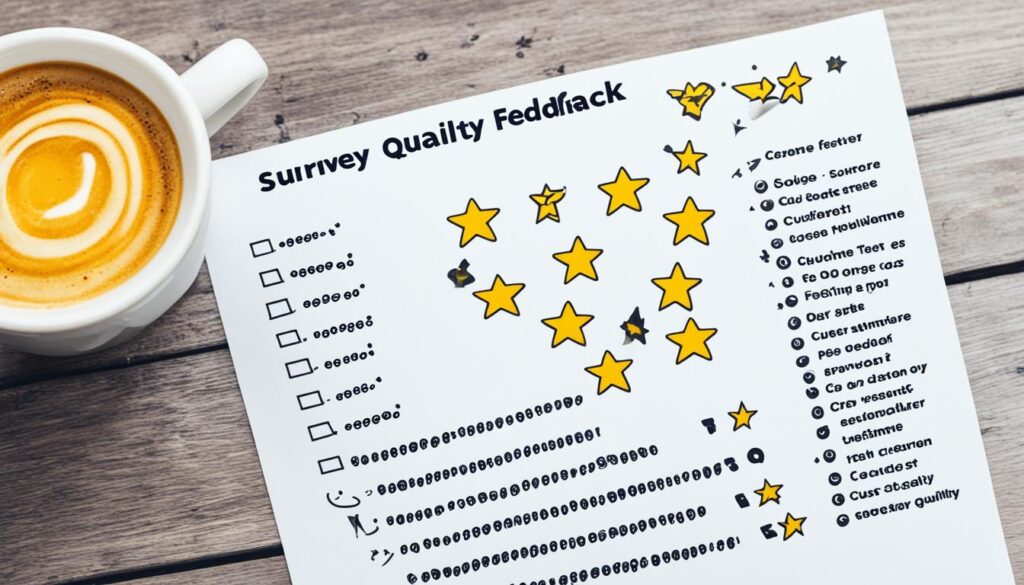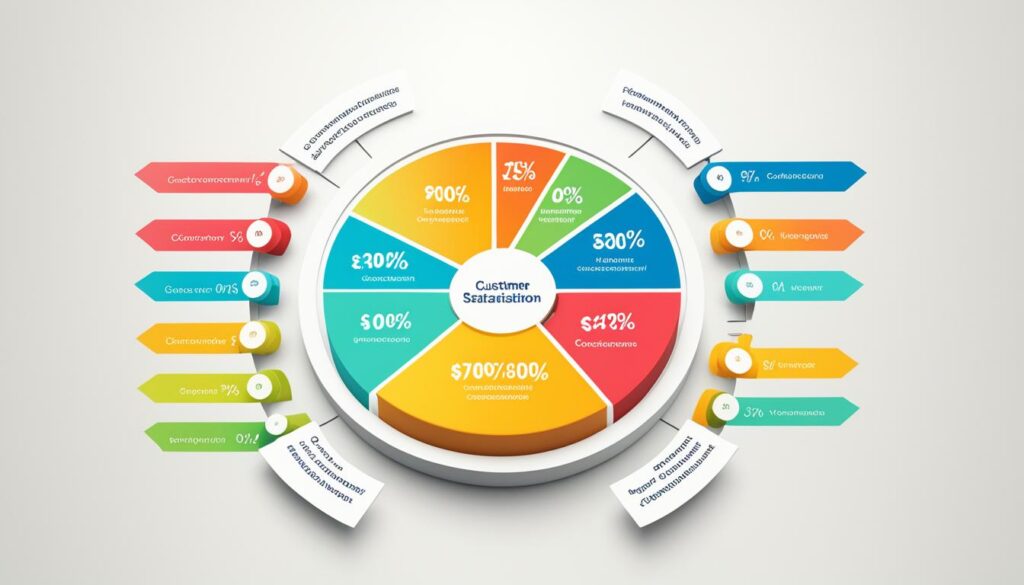Customer satisfaction is paramount for businesses striving to provide exceptional products and services. Understanding your customers’ needs, expectations, and areas for improvement is essential in this competitive landscape. One effective way to obtain valuable feedback is through customer satisfaction surveys.
Customer satisfaction survey templates streamline the process of creating and distributing surveys while ensuring that you ask the right questions. These templates are designed to gather insightful data about your customers’ experiences, preferences, and overall satisfaction. By using survey templates, you can optimize the feedback collection process and make data-driven improvements for your business.
When crafting your customer satisfaction survey, it’s important to consider the questions you ask and the structure of the survey. By using thought-provoking prompts and engaging survey questionnaires, you can encourage maximum participation and gather meaningful insights from your customers.
In this article, we will explore the importance of customer satisfaction surveys, discuss the key questions to include in your surveys, and provide insights into measuring customer satisfaction. By the end, you’ll be equipped with the knowledge and tools to optimize feedback and enhance customer satisfaction.
The Importance of Customer Satisfaction Surveys
Customer satisfaction surveys play a pivotal role in the success of customer centric businesses. These surveys enable organizations to gain valuable insights into customer opinions and shape the customer lifecycle. By understanding customer satisfaction levels, businesses can identify negative themes in the customer experience, gauge customer loyalty, and stay abreast of customer trends. This knowledge not only provides a competitive advantage but also validates crucial business decisions.
Customer satisfaction surveys allow businesses to assess customer satisfaction and make informed improvements. They help to identify areas where businesses may be falling short in meeting customer needs, enabling them to make the necessary adjustments. By gathering customer opinions through well-crafted surveys, businesses can ensure they are delivering exceptional experiences that foster customer loyalty and satisfaction.
Furthermore, customer satisfaction surveys establish a foundation for making data-driven decisions. When businesses align their strategies according to the feedback received from customers, they can better meet their expectations and enhance the overall customer experience. This customer-centric approach can significantly impact customer retention, delight, and future purchases.
Without customer satisfaction surveys, businesses would be left in the dark regarding customer satisfaction levels. They would be unable to effectively shape their strategies or make data-backed decisions. As a result, they risk losing their competitive edge and may struggle to meet the evolving needs of their customers.
“Customer satisfaction surveys are like compasses that guide customer centric businesses towards success.”
To illustrate the importance of customer satisfaction surveys, let’s consider a renowned e-commerce company. By regularly conducting customer satisfaction surveys, the company gained insights into negative themes surrounding late deliveries. Based on customer feedback, the company took immediate action to resolve these issues, leading to an improvement in customer satisfaction and loyalty.
By prioritizing customer satisfaction surveys, businesses can gain a clearer understanding of customer needs and expectations. This knowledge empowers businesses to make strategic decisions, refine processes, and continually improve the overall customer experience.
Shaping the Customer Lifecycle
Customer satisfaction surveys not only validate business decisions but also play a pivotal role in shaping the customer lifecycle. By analyzing feedback from surveys, businesses can identify areas where they can enhance the customer journey, from the initial touchpoint to post-purchase support. This knowledge allows businesses to create personalized experiences that cater to each customer’s unique needs, thereby fostering long-term loyalty.
- Maximize customer lifetime value: By implementing improvements based on customer satisfaction survey feedback, businesses can maximize customer lifetime value. Satisfied customers are more likely to become repeat buyers and recommend the business to others.
- Create a competitive advantage: Gathering insights from customer satisfaction surveys gives businesses a competitive edge. By understanding and addressing customer pain points, businesses can differentiate themselves and provide superior experiences compared to their competitors.
- Anticipate customer trends: Customer satisfaction surveys can uncover emerging trends and preferences. By staying ahead of the curve, businesses can adapt their strategies and offerings accordingly, ensuring they remain relevant and meet evolving customer expectations.
Customer satisfaction surveys are valuable tools that empower businesses to refine their strategies, validate their decisions, and cultivate strong and lasting relationships with their customers. By consistently seeking customer feedback, businesses can continuously improve, meet customer expectations, and achieve sustainable growth in today’s competitive marketplace.
Customer Satisfaction Survey Questions
When creating a customer satisfaction survey, it’s important to cover various aspects to gain valuable insights into your customers’ satisfaction and preferences. In addition to measuring overall satisfaction, you can delve deeper into demographics, product usage, and specific experiences. Here are some sample questions that can help you gather the data you need:
Demographics:
- What is your level of education?
- What is your annual household income?
- What is your job title?
- In which industry do you work?
In-store Experience:
- How likely are you to recommend our store to others?
- Are you satisfied with the service provided by our team?
- Did we resolve your inquiries promptly?
Online Experience:
- How likely are you to purchase from our website again?
- How likely are you to return to our website in the future?
By asking these customer satisfaction survey questions, you can gain valuable insights into your customers’ backgrounds, in-store experiences, and online interactions. This information will help you tailor your offerings to meet their needs and improve their overall satisfaction.

Customer Feedback Questions
When it comes to improving your products and services, gathering feedback from your customers is crucial. By asking the right questions, you can gain valuable insights into their experiences and preferences. Here are some customer feedback questions that can help you understand how your customers are using your products, identify areas for improvement, and gather insights for future enhancements:
- How frequently do you use our product?
- Have you achieved your goals using our product?
- What are the points of friction you have encountered while using our product?
- Do you have any suggestions for improving our product?
- What are your favorite features of our product?
- Have you explored any alternative products? If yes, what made you consider them?
- How would you rate your overall success in using our product?
Gathering answers to these customer feedback questions will provide you with valuable insights that can guide your product development and enhance customer satisfaction. By understanding how customers are using your product, you can make data-driven decisions to improve the user experience and meet their needs more effectively.

What is Customer Satisfaction (CSAT) Survey?
A customer satisfaction (CSAT) survey is a valuable tool used by organizations to understand and measure customer satisfaction levels. By asking customers to rate their level of satisfaction, businesses can determine their CSAT score, which represents how satisfied customers are with the organization. CSAT surveys use rating scales to collect data and provide businesses with insights into customer expectations and preferences.
Customer satisfaction surveys are instrumental in helping businesses gain a deeper understanding of their customers. They allow organizations to measure changes in satisfaction levels over time, identify areas for improvement, and monitor customer sentiment. By regularly conducting CSAT surveys, businesses can track their progress in meeting customer needs and making necessary adjustments.
Measuring customer satisfaction is crucial for businesses that aim to improve customer loyalty, enhance their products or services, and maintain a competitive edge in the market. CSAT surveys enable businesses to assess customer needs, identify potential issues or pain points, and segment customers based on their satisfaction scores.
To illustrate the importance of customer satisfaction surveys, consider the following scenario:
Company ABC recently implemented a CSAT survey to evaluate customer satisfaction levels. The survey revealed that 60% of customers were satisfied, while 40% expressed some level of dissatisfaction. By analyzing the survey responses, Company ABC was able to identify specific areas where improvements were needed, such as product quality and customer support. Armed with this knowledge, the company developed targeted strategies to address these concerns and enhance the overall customer experience.
By utilizing CSAT surveys, organizations can make data-driven decisions, prioritize areas of improvement, and ultimately increase customer satisfaction. These surveys provide valuable insights that help businesses understand their customers better, meet their expectations, and build long-term relationships.
Benefits of a Customer Satisfaction (CSAT) Survey:
- Understanding satisfaction levels and identifying areas for improvement
- Measuring changes in customer satisfaction over time
- Gaining a deeper understanding of customer expectations and preferences
- Assessing customer needs and identifying potential problems or pain points
- Segmenting customers based on their satisfaction scores
Implementing CSAT surveys can significantly impact businesses by helping them optimize their processes, enhance customer loyalty, and foster growth. These surveys enable organizations to stay responsive to customer feedback and continuously improve their products, services, and overall customer experience.

How Do I Measure Customer Satisfaction?
Measuring customer satisfaction is crucial for businesses to understand the key drivers behind customer experiences. By gathering feedback through customer satisfaction surveys, you can gain valuable insights into customer satisfaction levels and make data-driven decisions to improve your business.
Customer satisfaction surveys provide various metrics that help gauge customer affinity, measure customer effort, and assess overall satisfaction. One commonly used metric is the Net Promoter Score (NPS), which measures customer loyalty and likelihood to recommend your product or service to others.
Another valuable metric is the Customer Effort Score (CES), which measures the ease of the customer’s experience with your company. By asking customers about the effort they had to put forth to resolve an issue or achieve their goals, you can identify areas for improvement and optimize their experience.
Likert scale questions are also effective in measuring customer satisfaction. These questions allow customers to provide feedback on a numerical scale, indicating their level of agreement or satisfaction. By analyzing these responses, you can identify trends, prioritize improvements, and make informed decisions to enhance customer satisfaction.
FAQ
What are customer satisfaction survey templates?
Customer satisfaction survey templates are pre-designed surveys that businesses can use to gather feedback from their customers. These templates provide a structure and framework for creating effective surveys, making it easier for businesses to collect valuable insights and improve customer satisfaction.
How can customer satisfaction surveys benefit my business?
Customer satisfaction surveys are essential for businesses as they help identify negative themes in the customer experience, gauge customer loyalty, and provide a competitive advantage. These surveys validate business decisions and shape the customer lifecycle, influencing factors such as retention, delight, and future purchases.
What kind of questions should be included in a customer satisfaction survey?
Customer satisfaction survey questions should cover various aspects such as demographics, product usage, and overall satisfaction. Some sample questions include asking about the customer’s level of education, annual household income, job title, and industry. Other questions can focus on the in-store experience, likelihood to recommend, satisfaction with the team, prompt inquiry resolution, likelihood to repurchase, and likelihood to return to the website.
What should I ask in customer feedback questions?
Customer feedback questions should aim to gather comprehensive feedback about the customer’s experience and preferences. Questions can focus on product usage, customer success, finding alternatives, frequency of product use, goals achieved, points of friction, suggestions for improvement, and favorite product features. These questions help businesses understand how customers are using their products, identify areas for improvement, and gather insights for future enhancements.
What is a customer satisfaction (CSAT) survey?
A customer satisfaction (CSAT) survey is used to determine a CSAT score by asking customers about their level of satisfaction with an organization. These surveys help businesses understand customer satisfaction levels, measure changes over time, and gain a deeper understanding of customer expectations. CSAT surveys use rating scales and can be used to assess customer needs, identify problems, and segment customers based on their scores.
How can I measure customer satisfaction?
Measuring customer satisfaction requires understanding the key drivers behind customer experiences. Customer satisfaction surveys, such as the Net Promoter Score (NPS), Customer Effort Score (CES), and Likert scale questions, provide valuable insights into customer satisfaction. These metrics help businesses gauge customer affinity, measure customer effort, and assess overall satisfaction. By choosing the right type of survey and asking relevant questions, businesses can effectively measure and improve customer satisfaction.
